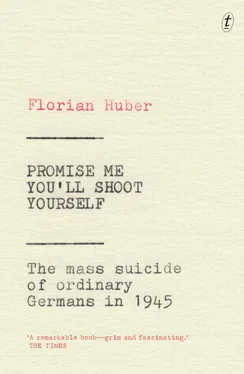Once again, though, she let herself be reassured; this time, the local chief of police promised to vouch personally for her safety, if she had to flee with her family. In the meantime, he asked her to put up the wife and child of an SS officer friend of his. Marie Dabs clutched at this straw, trusting the authorities rather than her own inner voice. She would later write in her memoir:
They joined us for every meal, but the high-ranking SS officer didn’t see fit to give me any advice. We couldn’t help but wonder, though, when we saw the crowds trekking west along our streets, and the ships of refugees in the harbour. I sincerely hoped that our police chief would keep his promise to bring us to safety along with his wife and daughter!
• • •
Until then, the people of Demmin had known the war only from the newspapers, radio and weekly newsreels. Sometimes, it is true, they were driven into their cellars by the air-raid sirens, but the bombers always flew on, to Stettin or Berlin. On some nights, residents had seen the glow of Anklam, burning on the eastern horizon, and on a few occasions the US bombers had attacked the air base at Tutow, only ten kilometres further east. But not a single bomb had fallen on Demmin. The town was an island in the middle of the war.
Ursula Strohschein, who lived with her parents not far from the Dabs’ fur shop in the old town, in Luisenstrasse, had recently returned home from a visit to the ruined wastes of bombed-out Hamburg. After such a harrowing experience, the sight of the undamaged town gave her new hope. ‘It wasn’t just that I was glad to see it again,’ she said. ‘I felt blessed, too.’ The burgher houses with their pediments and casement windows, the old half-timbered houses, the sixteenth-century tower still standing on Turmstrasse, the Luise Gate beyond, the gently flowing River Peene—all these things made it easy to feel that events might simply pass Demmin by.

Market square, town hall and the church of St Bartholomaeus in pre-1945 Demmin
But Ursula wasn’t stupid, and nor was she deaf or blind. She knew what she’d seen in Hamburg. She’d heard the reports from soldiers home on leave or billeted in Demmin. She knew what had happened to the refugees who had lost their towns and villages to the Russians and were now flooding west in even larger numbers than before—stubbly-whiskered old men in battered hats, stooped grannies, hollow-eyed young women in headscarves with harassed looks on their faces, snotty-nosed children in stinking pants. ‘Crammed full of strangers’ was Ursula Strohschein’s description of Demmin at that time. The ‘strangers’ inched their way along the streets in halting convoys of carts and barrows and prams, all piled high with swaying towers of the possessions they’d managed to salvage: blankets and pillows, washing baskets, suitcases and rucksacks, wedged and lashed with string. They were a wretched procession, flushed out onto the streets and squares and fields by the ever-advancing front. By late April, the party quartermaster no longer knew what to do with them all. The houses and schools were full to bursting; so were the estates and farms in the surrounding countryside. Those without a roof over their head had to stay in their carts and spend the nights on the road. Even the people of Demmin, so far mere onlookers, had to ask themselves whether to stay or go.
Ursula Strohschein could feel fear and apprehension all through the town. A Hitler Youth banner leader was billeted in her aunt’s beautiful burgher house near the marketplace. ‘What will become of Demmin?’ her aunt asked the young man. ‘We’ll defend Demmin!’ he replied. We , Ursula observed drily, meant a handful of Hitler Youth boys and Volkssturm men. ‘Herr Banner Leader’ did not hang around to discuss the matter, but hurried upstairs to get changed and then made himself scarce.
• • •
On Saturday 28 April, Dr Wilhelm Damann took a walk through the boys’ high school in Frauenstrasse, a dark-red building with a pointed ridge turret. Damann had been a teacher himself, but lost his job when the Nazis came to power. Now lessons had been suspended all over town, and the red-brick school had been converted into a military hospital, its corridors filled with wounded and dying soldiers. In the school hall, where leaving ceremonies had once been held in solemn formality, and half-grown men sent forth into the world with edifying words, doctors now cut bullets and shrapnel out of the half-grown men’s flesh and sawed off their arms and legs. Today, though, Wilhelm Damann could see from the corridor that the hall was being cleared of wounded men. Those who didn’t get a place in a truck or requisitioned removal van had to make do with a horse and cart. When Damann stepped out onto Frauenstrasse again, the street was full of German soldiers, all heading towards Peene Bridge. Fighting against this flow were people carrying boxes and bags crammed full of groceries. The army food stores and depots had been opened. That’s when Damann knew it was the beginning of the end: ‘Things were starting to fall apart.’
• • •
The Wehrmacht made no secret of their intention to surrender the town and blow up the bridges behind them as they moved west. It was the last chance of escape for any doubters and ditherers. Others had long been preparing for this moment. High-ranking Nazis, leaders of party organisations, the district administrator, the mayor, the head of the grammar school, local officials—such people set off west with few regrets.
From Marie Dab’s fur shop, it was only a short walk to the wide market square, and she went to the town hall to talk to the chief of police, who had promised to vouch for her when the time came. What she saw in the square ‘beggared belief’:
Our entire police force was sitting on the back of a truck, and the chief stood beside it, ready to join them. He called out to me: ‘Do you want to come with us? Jump up!’ I stood there, stunned, unable to say a word.
Without the children? Never! Marie Dabs could only stand and watch as the truck drove off—and with it, her last hope of getting out of Demmin in time. Two things struck her at this moment. The first was her betrayal by the chief of police, whose promises she had blindly trusted to the end—and he hadn’t been alone in jumping on the truck; all the other policemen in town who’d talked her into staying were complicit in this betrayal. Marie Dabs thought, too, of the high-ranking SS officer whose wife and child had moved in with her. He’d blown in for dinner from time to time but had little to say for himself, although he must have been well informed—and then one day he’d been gone, and his wife with him. There was the Wehrmacht general, too, who’d bought up her entire supply of medals and sworn blithely: ‘The Russians won’t make it over the River Oder!’ She’d never seen him again either. It was the same story with all the people from the party—Otto’s Deutsches Jungvolk leader, for example, and the district group leader—they had all spread hope and refused to hear of escape, and now they’d gone and escaped themselves.
Worse, though, than these people’s betrayal was that Marie Dabs had believed them rather than herself. ‘How naive I was.’ She was shocked by her own gullible stupidity, her feeble wait-and-see attitude. Despite having some idea of what was going on and sensing that their lives were at risk, she’d persisted in shutting out the truth and letting herself be hushed. Now it was too late. From this point in her memoirs, Marie Dabs’ narrative is shot through with self-reproach, as she accuses herself of having failed herself and her children. ‘Why didn’t I do it? Why didn’t I leave when the Hansens telegraphed me? I did all the wrong things, and cruel fate ran its course.’
Читать дальше













